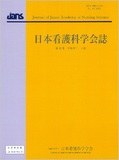Japanese
English
- 販売していません
- Abstract 文献概要
- 参考文献 Reference
要旨
目的:大規模病院に勤務する看護師の自己教育性に関連する要因を明らかにする.
方法:78施設の看護師5,636名を対象とし無記名自記式質問紙調査を実施した.調査は看護師の自己教育性尺度27項目(野寄・清水,2022)と先行研究より選定した個人特性6項目と職場特性21項目である.分析は看護師の自己教育性を目的変数,個人特性,職場特性を説明変数とし重回帰分析を行った.
結果:有効回答1,446名を分析した結果,看護師の自己教育性尺度の総得点および下位尺度の得点には看護師経験年数,支えてくれる家族の存在,介護経験,職場の内省支援・精神支援,役割付与・役割認識,職場の学習環境が有意に関連していた(p<0.05).
結論:他者からの内省支援・精神支援,他者との社会的相互作用による学ぶ機会が看護師の自己教育性を高める要因であること,承認や役割付与が高める要因である一方で,低下させる要因でもあることが示された.
Purpose: To identify factors related to the self-education of nurses working in large hospitals.
Methods: A self-administered, anonymous questionnaire survey was administered to 5,636 nurses at 78 facilities. The survey comprised 27 items from the Self-education Scale for Nurses (Noyori&Shimizu, 2022), 6 items of personal characteristics selected by the researchers, and 21 items of workplace characteristics from previous studies. Multiple regression analysis was conducted using nurses' self-education as the objective variable and individual and workplace characteristics as explanatory variables.
Results: The analysis of 1,446 valid responses showed that the total score and subscale scores of the nurses' self-education scale were significantly related to the number of years of nursing experience, presence of supportive family members, nursing experience, reflective and emotional support in the workplace, role assignment and recognition, and learning environment in the workplace (p<0.05).
Conclusion: Reflective and emotional support from others and opportunities to learn through social interactions increase the self-education of nurses. In addition, role recognition and assignment enhance but also decrease the self-education of nurses.
Copyright © 2023, Japan Academy of Nursing Science. All rights reserved.


